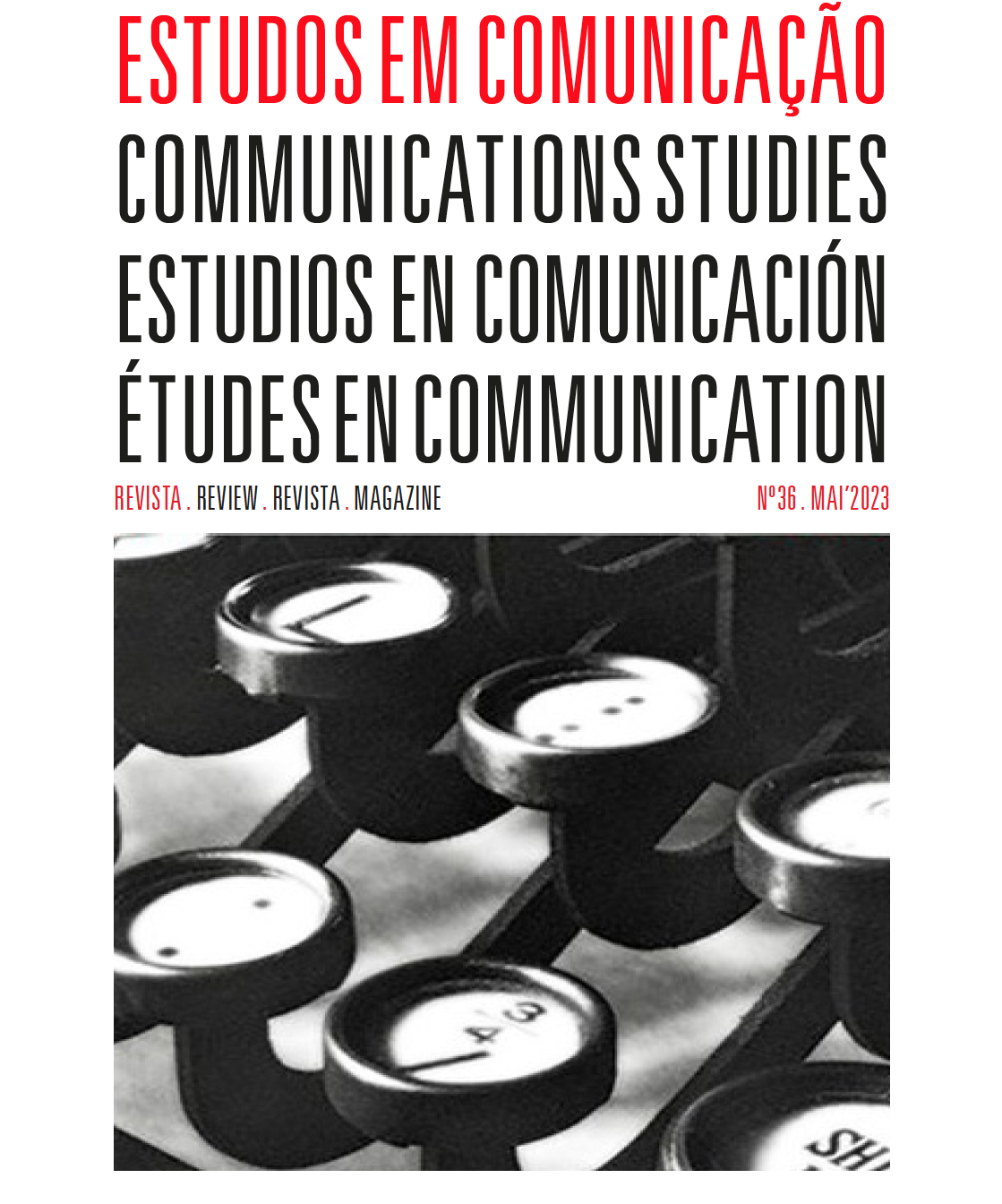#17Fev e a denominada revolução nos média sociais: uma década após a revolta da Líbia
Palavras-chave:
ativismo nos média sociais, hashtags, Primavera Árabe, guerra nos média sociaisResumo
Uma década após o fim do regime de Kadhafi na Líbia, o país continua envolto numa guerra civil e numa crise humanitária. Após mais de 40 anos sob um regime autocrático, a Primavera Árabe foi a promessa de uma transição para a democracia com a garantia de assegurar os direitos humanos e a liberdade de expressão. Em 2011, vários atores defenderam a mudança de regime e o ativismo através dos média sociais foi mobilizado em diferentes abordagens. Como resultado, o dia que ficou conhecido como #17feb foi o início do fim da ditadura de Kaddafi. Este artigo procura contribuir para uma reflexão sobre o papel dos média sociais na revolta e na situação pós-revolução, considerando o ativismo e a sua apropriação propagandística. Em última análise, este artigo pretende contribuir para um registo histórico sobre o papel do ativismo nos média sociais durante a Primavera Árabe na Líbia.
Referências
Alqudsi-Ghabra, T. (2012). Creative use of social media in the revolutions of Tunisia, Egypt & Libya. International Journal of Interdisciplinary Social Sciences, 6(6), 147-158.
Alterman, J. B. (2011). The revolution will not be tweeted. The Washington Quarterly, 34(4), 103-116. DOI: 10.1080/0163660X.2011.610714
Amaral, I. (2014). Lybia. In K. Harvey (Org.), Encyclopedia of Social Media and Politics (pp. 767-771), Vol. 2. Thousands Oaks, CA: Sage Publications.
Amaral, I. (2016). Redes sociais na internet: sociabilidades emergentes. Covilhã: Editora LabCom.
Amaral, I. (2020). Participation and Media| Citizens Beyond Troika: Media and Anti-Austerity Protests in Portugal. International Journal of Communication, 14(21), 3309–3329. DOI: 1932–8036/20200005
Bennett, W. L., & Segerberg, A. (2012). The logic of connective action: Digital media and the personalization of contentious politics. Information, communication & society, 15(5), 739-768. DOI: 10.1080/1369118X.2012.670661
Bickford, S. (2011). Emotion talk and political judgment. The Journal of Politics, 73(4), 1025-1037. DOI: 10.1017/S0022381611000740
Bimber, B. (2017). Three prompts for collective action in the context of digital media. Political Communication, 34(1), 6-20. DOI: 10.1080/10584609.2016.1223772
Biswas, M., & Sipes, C. (2014). Social Media in Syria's Uprising and Post-Revolution Libya: An Analysis of Activists' and Blogger's Online Engagement. Arab Media & Society (19), 1-21.
Bucher, T. (2018). If... then: Algorithmic power and politics. Oxford University Press.
Bucher, T., & Helmond, A. (2018). The affordances of social media platforms. In Burgess, J, Poell, T, Marwick, A (eds) The Sage Handbook of Social Media (pp. 233-253). London; New York: SAGE.
Comunello, F., & Anzera, G. (2012). Will the revolution be tweeted? A conceptual framework for understanding the social media and the Arab Spring. Islam and Christian–Muslim Relations, 23(4), 453-470. DOI: 10.1080/09596410.2012.712435
Cottle, S. (2011). Media and the Arab uprisings of 2011: Research notes. Journalism, 12(5), 647-659. DOI: 10.1177/1464884911410017.
Dahlberg, L. (2001). The Internet and democratic discourse: Exploring the prospects of online deliberative forums extending the public sphere. Information, Communication & Society, 4(4), 615-633. DOI: 10.1080/13691180110097030
Duncombe, C. (2011). The Twitter revolution? Social media, representation and crisis in Iran and Libya. In Australian Political Science Association Conference (APSA) 2011 (pp. 1-12). Australian National University, School of Politics and International Relations.
Elareshi, M. (2020). Media and social change in Libya. In Miladi, N., & Mellor, N. (Eds.) Routledge Handbook on Arab Media (pp. 193-204). London, New York: Routledge.
Gerbaudo, P. (2012). Tweets and the Streets: Social media and contemporary activism. Pluto Press.
Ghannam, J. (2011). Social Media in the Arab World: Leading up to the Uprisings of 2011. Center for international media assistance, 3(1), 1-44.
Gillespie, T., Boczkowski, P. J., & Foot, K. A. (Eds.). (2014). Media technologies: Essays on communication, materiality, and society. MIT Press.
Goldstone, J. A. (2011). Understanding the revolutions of 2011: weakness and resilience in Middle Eastern autocracies. Foreign Affairs, 90(3), 8–16
Granovetter, M. S. (1973). The strength of weak ties. American Journal of Sociology, 78(6), 1360-1380. DOI: 10.1086/225469
Harlow, S. (2013). “It was a Facebook revolution”: Exploring the meme-like spread of narratives during the Egyptian protest. Revista de Comunicación, (12), 59-82.
Human Rights Watch (2006). Libya: Words to Deeds The Urgent Need for Human Rights Reform. https://www.hrw.org/reports/2006/libya0106/index.htm
Human Rights Watch (2015). War on the Media. Journalists under Attack in Libya. https://www.hrw.org/reports/2006/libya0106/index.htm
Jenkins, H. (2006). Convergence Culture: Where Old and New Media Collide. New York: New York University Press.
Kitchin, R. (2017). Thinking critically about and researching algorithms. Information, Communication & Society, 20(1), 14-29. DOI: 10.1080/1369118X.2016.1154087
Krause, S. R. (2008). Civil passions. Princeton University Press.
Krause, S. R. (2011). Empathy, democratic politics, and the impartial juror. Law, Culture and the Humanities, 7(1), 81-100. DOI: 10.1177/1743872109355567
Morris, L. (2014). Contextualizing the power of social media: Technology, communication and the Libya Crisis. First Monday 19(12). DOI: 10.5210/fm.v19i12.5318
Papaioannou, T., & Olivos, H. E. (2013). Cultural identity and social media in the Arab spring: Collective goals in the use of Facebook in the Libyan context. Journal of Arab & Muslim Media Research, 6(2-3), 99-114. DOI: 10.1386/jammr.6.2-3.99_1
personalization of contentious politics. Information, Communication & Society, 15(5), 739–768.
Rane, H., & Salem, S. (2012). Social media, social movements and the diffusion of ideas in the Arab uprisings. The Journal of International Communication, 18(1), 97-111. DOI: 10.1080/13216597.2012.662168
Reardon, S. (2012). Was it really a Facebook revolution?. New Scientist, 214(2859), 24. DOI: 10.1016/S0262-4079(12)60889-6
Reporters Without Borders (2010/2016). Reporters Without Borders contributes to UN Human Rights Council review of Libya. https://rsf.org/en/news/reporters-without-borders-contributes-un-human-rights-council-review-libya
Rogers, R. (2009). Mapping public Webspace with the Issuecrawler. In Brossard, C., & Reber, B. (Eds.) Digital Cognitive Technologies: Epistemology and Knowledge Society (pp. 115-126). London: Whiley.
Wardle, C., & Derakhshan, H. (2017). Information disorder: Toward an interdisciplinary framework for research and policy making. Council of Europe, 27.


